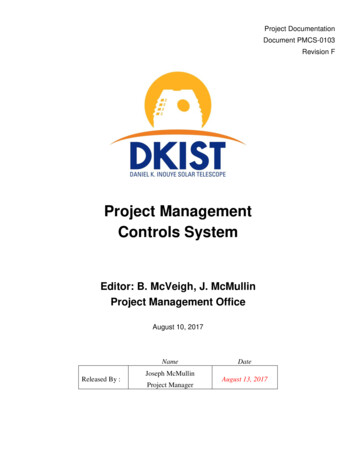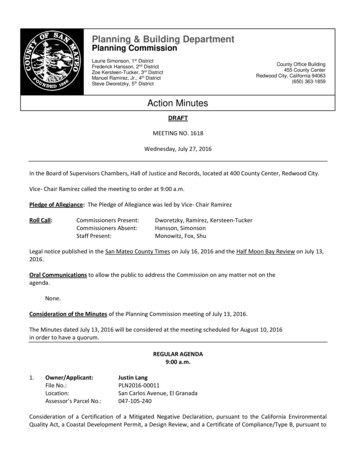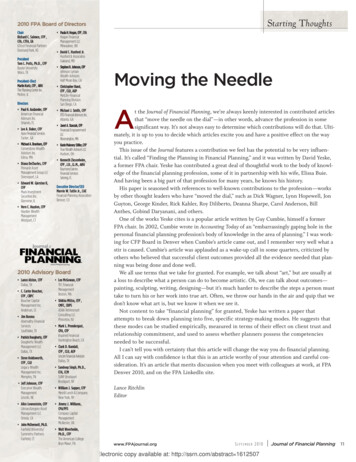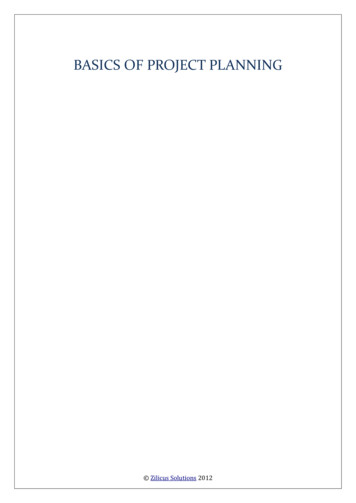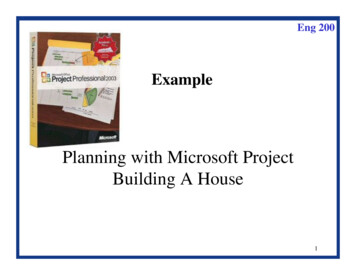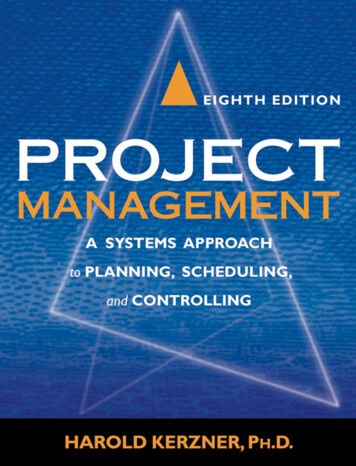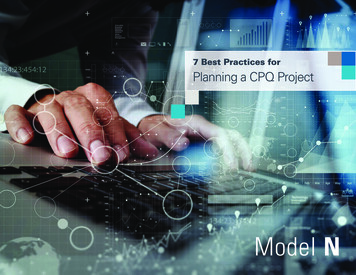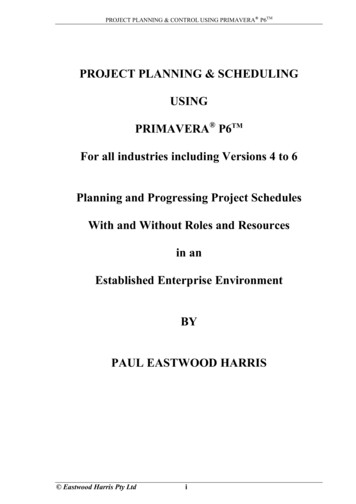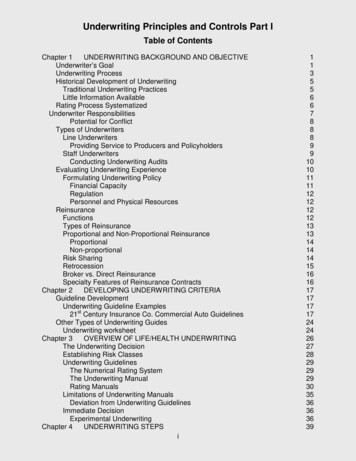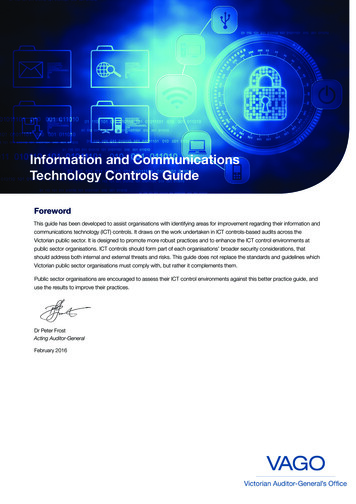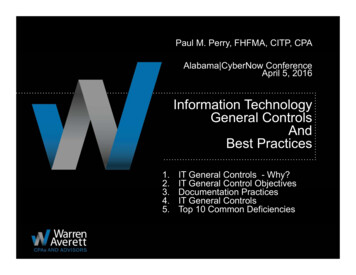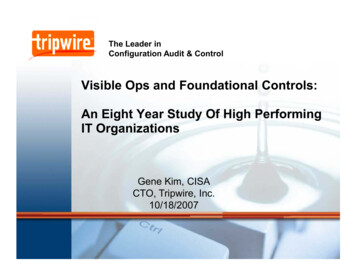
Transcription
CE566 ProjectSchedulingControls:PlanningandUnits: 3Fall 2017—Thursday—7pm to 9:40pmLocation: SAL 126Instructor: Devang Dedhia, PSPOffice Hours: 30mins before and after class on class days,or by prior appointmentContact Info: dedhia@usc.edu cell: (323)-445-0137(Please allow 2-3 business days for a response)Teaching Assistant: Evangelos PantazisOffice: KAP 239Office Hours: Monday 5pm to 7pm (or by prior appointment)Contact Info: epantazi@usc.eduBlackboard Help: Blackboard HelpHours of Service: 24/7Contact Info: https://studentblackboardhelp.usc.edu/ Call 213-740-5555 and choose option 2 Text chat and Blackboard 9 Support Portal Send an email to blackboard@usc.eduViterbi IT Help: Viterbi IT HelpHours of Service: Mon-Fri, 8am – 5pmContact Info: tance/ Call 213-740-0517 Send email to engrhelp@usc.edu Walk-In support is available by visiting DRB 205Revised August 2017
Course DescriptionIn today’s increasingly fast-paced and connected work environment, there is increased focus ondelivering complex construction projects on-time and on-budget. There is a demand for increasedcontrol and communication to respond to changing project conditions. Effective project controlsprovides a solution to successful manage any project that every team member needs to understandand master. This course is designed to educate, encourage and inspire future leaders aboutplanning and scheduling principles which drive successful projects. The course demonstrates howstudents integrate various data elements into their project planning and schedule. This course willhelp the students connect various learning concepts from other CEE courses. In this course, studentwill learn about various planning and scheduling methodologies, master the CPM method, learn todevelop a schedule plan, evaluate the plan, monitor the progress, and learn how to respond tovariances in the plan.Learning Objectives Provide an understanding of the components of project controlsLearn various Planning and Scheduling MethodologiesLearn to develop a schedule plan, evaluate the plan, monitor the progress and respond tovariances in the plan Learn the CPM method (critical path method) Learn about deterministic and probabilistic scheduling methods Introduce the student to the use of Oracle’s Primavera P6 scheduling software, which is theleading industry scheduling software for creating and maintaining CPM schedulesAs a result of taking the course, the student will be Able to apply their knowledge of Planning and Scheduling on any project Able to develop a schedule plan, monitor and forecast completion dates Learn about industry best practices for planning and schedulingThe classroom discussions will emphasize on the theory and understanding of about the variousconcepts and methodologies related to Planning and Scheduling. The students will be introduced toOracle’s Primavera P6 scheduling software operations and are expected to develop mastery outsidethe classroom. Students can use university provided computers or personal computers to learnOracle’s Primavera P6 scheduling software operations. Coursework and assignments will form thebasis of the group project. Students can access all the course material, assignment, announcementsand discussions through BlackBoard.While the course syllabus lists an outline of course material, class discussions and progress will guidecoverage of course material. Participation by students in class is required. All questions will beaddressed; no question is invalid. While office hours are limited due to work constraints, all effortswill be made to meet and resolve any questions or issues you may have.Recommended Preparation: In order to acquire maximum benefit from this course, it is advisableto have a basic understanding of the various construction activities and work. Students without priorwork experience are advised to take the CE556: Project Controls - Estimating Course, but this is notmandatory.Technological Proficiency and Hardware/Software Required BlackBoardSyllabus v3.0 for CE 566, Page 2 of 6
MS Word, MS Excel, and MS Powerpoint will be utilized. Students must have a workingknowledge of computer systems & MS Office suite of applications.Required Readings and Supplementary MaterialsCourse Bibliography:1. Construction Planning and Scheduling Second Edition, Thomas E. Glavinich, D.E., P.E., TheAssociated General Contractors of America, 2004, ASIN: B001D06PIM, ISBN-13: 978-00100341582. PRIMAVERA PROJECT PLANNER (P6) SOFTWARE HELP FEATURERecommended Reference Books:1. Planning and Control Using Oracle Primavera P6 Versions 8, 15 and 16 PPM Professional, Paul EHarris, Eastwood Harris, 2016, ASIN: B01JVW17FE2. CPM Scheduling for Construction: Best Practices and Guidelines, PMI, 2014ISBN13: 978-1-62825-037-43. Oracle Primavera P6 (Version 8.1 Professional Client) Beginner's Guide, Kugan Panchadsaram,ASIN B00B56CJV6 (Available as E-Book for Kindle)Grading Breakdown Assignments will demonstrate the student understanding of the principle or procedureintroduced in the preceding class. Quizzes and Exams will consist of multiple choice questions,written calculations, questions with short answers as well as schedule software file solutions.Each assignment and quiz will have equal weightage towards its category (25% of the FinalLetter Grade).The team project objective will be to develop a schedule to demonstrate execution plan for asmall construction project. Teams will consist of a group of minimum 3 students and amaximum of 5 students. Further instructions will be provided in class.Final Letter Grade will be distributed on a curve based on the Total score with the breakdownshown belowCATEGORYWeekly Participation, Assignments andQuizMid-Term ExamGroup ProjectFinal ExamTotalPOINTS25%25%20%30%100%Assignment Submission PolicyWork in the current session will build on completed assignments. Students will refer to courseschedule for assignment due dates. Weekly assignments are due at the beginning of the class.Students shall include their name on each page of the assignments for both hard copies & electroniccopies. When submitting electronic files, please include your student name in the filename(s).Students will get one (1) attempt to submit the assignment. Students are responsible for submittingcomplete file(s) in their latest attempt.Syllabus v3.0 for CE 566, Page 3 of 6
Any assignment attempts submitted after first attempt will be treated as a Late assignment. Lateassignments will be accepted and 20% points per day will be deducted for a late submission. Lateassignments will not be accepted after 11/23/17 or 1 week from original due date, whichever isearlier.Grading TimelineAssignments will be graded and returned before the next class.Course Schedule: Weekly BreakdownWeek 18/24/17Week 28/31/17Week 39/7/17Week 49/14/17Week 59/21/17Week 69/28/17Week 710/5/17Week 810/12/17Topics/Daily ActivitiesProject Life Cycle Phases.Overview of Project ControlsContract DocumentsReadingsGlavinich Chapter 1CPM Scheduling Chapter 1,2.1-2.5Glavinich Chapter 1CPM Scheduling Chapter 2.1 –2.5Glavinich Chapters 5, 6, 7, 17Network Methods, DiagrammingBuilding the NetworkCPM Method. Defining Scope of Glavinich Chapters 5, 6, 7, 17Work Work BreakdownCPM Scheduling Chapters 2.6 Structure techniques3.4Harris Chapter 2Hierarchical Structures andKugan Module 2, 5, 6, 7, 9Work Breakdown StructuresHarris Chapter 2, 3, 4, 6, 22,Quiz24Use of Calendars & ConstraintsCPM Scheduling 3.8 – 3.10in schedule networksHarris Chapters 2, 5, 7, 11Kugan Module 8, 13Mid-Term ExamActivities and Logic,Schedule Network CalculationsWeek 910/19/17Formatting Schedule NetworkData – filter, sort and scheduleorganization.Week 1010/26/17Resource Management –Revenue, Cost, and MarginWeek 1111/2/17Resource Analysis - ResourceUtilization and CumulativeCurvesGlavinich Chapter 2, 3CPM Scheduling 3.5 – 3.6;Kugan Module 10, 11, 12Harris Chapter 7, 9Glavinich Chapter 8CPM Scheduling 3.14, 5.4.1Kugan Module 4, 15Harris Chapter 8, 12, 13, 22Glavinich Chapter 19,21CPM Scheduling 3.11;Kugan Module 16, 17, 18Harris Chapter 18, 19, 20Glavinich Chapter 19,21CPM Scheduling 5.4Kugan Module 19Harris Chapter 20, 27Assignment Due--ContractQuestionnaireCPM NetworkDiagramCPM CalculationCreate Project &WBSCreate CalendarsDefining Activities &Assigning LogicSchedule ReportsCost-loading &Resource-LoadingSyllabus v3.0 for CE 566, Page 4 of 6
Week 1211/9/17Week 1311/16/17Week 1411/23/17Week 1511/30/17FINAL12/7/17Progress Monitoring &Reporting - Forecaste andCompare Current plan againstBaseline planProbabilistic SchedulesThanksgiving RecessNo ClassChange Management DelayClaims – Quantitative andQualitative IssuesFinal Exam - Written and LabGlavinich Chapter 14, 22CPM Scheduling 4Kugan Module 21, 22, 23Harris Chapter 14, 15, 16, 21CPM Scheduling 3.12 & 3.14Glavinich Chapter 16CPM Scheduling 5.6; 5.7.1,5.7.2Resource Curves &HistogramBaseline & ScheduleUpdatingGroup Project DueStatement on Academic Conduct and Support SystemsAcademic Conduct:Plagiarism – presenting someone else’s ideas as your own, either verbatim or recast in your ownwords – is a serious academic offense with serious consequences. Please familiarize yourself withthe discussion of plagiarism in SCampus in Part B, Section 11, “Behavior Violating UniversityStandards” https://policy.usc.edu/scampus-part-b/. Other forms of academic dishonesty areequally unacceptable. For example, Unauthorized collaboration on a project, homework or other assignment. Collaborationwill be considered unauthorized unless expressly part of the assignment in question orexpressly permitted by the instructor. Obtaining for oneself or providing for another person a solution to homework, a projector other assignment, or a copy of an exam or exam key without the knowledge andexpressed consent of the instructor.See additional information in SCampus and university policies on scientificmisconduct, t Systems:Student Counseling Services (SCS) - (213) 740-7711 – 24/7 on callFree and confidential mental health treatment for students, including short-term du/counseling/National Suicide Prevention Lifeline - 1-800-273-8255Provides free and confidential emotional support to people in suicidal crisis or emotional distress24 hours a day, 7 days a week. ip & Sexual Violence Prevention Services (RSVP) - (213) 740-4900 - 24/7 on callFree and confidential therapy services, workshops, and training for situations related to genderbased harm. https://engemannshc.usc.edu/rsvp/Syllabus v3.0 for CE 566, Page 5 of 6
Sexual Assault Resource CenterFor more information about how to get help or help a survivor, rights, reporting options, andadditional resources, visit the website: http://sarc.usc.edu/Office of Equity and Diversity (OED)/Title IX compliance – (213) 740-5086Works with faculty, staff, visitors, applicants, and students around issues of protected class.https://equity.usc.edu/Bias Assessment Response and SupportIncidents of bias, hate crimes and microaggressions need to be reported allowing for appropriateinvestigation and response. ponse-support/Student Support & Advocacy – (213) 821-4710Assists students and families in resolving complex issues adversely affecting their success as astudent EX: personal, financial, and academic. https://studentaffairs.usc.edu/ssa/Diversity at USCTabs for Events, Programs and Training, Task Force (including representatives for each school),Chronology, Participate, Resources for Students. https://diversity.usc.edu/Syllabus v3.0 for CE 566, Page 6 of 6
2. PRIMAVERA PROJECT PLANNER (P6) SOFTWARE HELP FEATURE Recommended Reference Books: 1. Planning and Control Using Oracle Primavera P6 Versions 8, 15 and 16 PPM Professional, Paul E Harris, Eastwood Harris, 2016, ASIN: B01JVW17FE 2. CPM Scheduling for Construction: Best
